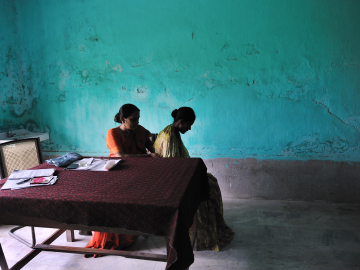Best Global Health Books of 2017
If you take comfort in books, a number of global health books published in 2017 struck a similar note: yes, doom might be knocking on our door, but whether the crisis is climate change, infectious diseases, or antibiotic resistance, there are still things we can do to make it better. In other words, cause for hope.
Deadliest Enemy: Our War Against Killer Germs, Michael T. Osterholm and Mark Olshaker
The infectious disease community faces daunting challenges, but Osterholm sees hope in that battle, too. "I have the reputation as 'Bad News Mike,'" Osterholm explains in CIDRAP. "But it's not just bad news [in the book]. I'm also saying, 'Wake up, there's something you can do about it.' I guess I'm at the age where I'm looking at what kind of world I'm leaving for my kids and grandkids, and I want to make sure we do what we can to stop disease."
Little, Brown and Company, March 14, 2017
Hot, Hungry Planet, Lisa Palmer
Climate change and chronic undernourishment exist side-by-side in certain areas of the world. Finding hunger solutions is urgently important, especially with the global population on trend to explode 25% by 2050.
Journalist Lisa Palmer’s Hot, Hungry Planet outlines 3 concepts crucial to ending hunger— social, educational and agricultural advances; land use and technological innovations on farms; and policy changes—and illustrated by case studies from critical areas around the globe like India, Latin America, and the Middle East. Hopeful and remarkable, Palmer’s research sheds light on what can be done to end world hunger, and what it will take to get there.
St. Martin's Press, May 9, 2017
Big Chicken: The Incredible Story of How Antibiotics Created Modern Agriculture and Changed the Way the World Eats, Maryn McKenna
McKenna’s book won broad praise for exposing the staggering role of antibiotics in industrial farming—but her book, studded with fascinating facts and anecdotes, also maps out a way we can fly the catastrophic coop we’ve created.
National Geographic, September 12, 2017
Pale Rider: The Spanish Flu of 1918 and How It Changed the World, Laura Spinney
Spinney builds the case that the Spanish flu of 1918-1920—one of history’s greatest human disasters, infecting a third of the world’s people—was as significant as both world wars, altering the course of history in politics, race relations and family structures. It also helped governments see the need for a public health approach.
PublicAffairs, September 12, 2017
Periods Gone Public, Jennifer Weiss-Wolf
Calling menstrual inequity— from tampon taxes, to keeping menstruating girls away from school—a “Code Red Crisis,” Weiss-Wolf shows how women in poverty suffer disproportionately from the entrenched stigma surrounding periods.That extends beyond the developing world, Weiss-Wolf notes, to include low-income and transgender communities in countries including Australia, Canada, and the US.
One practical observation from Weiss-Wolf: stigma-busting often goes hand-in-hand with product creation. Eleanor J. Bader, in a review in Rewire, calls the book “…simultaneously practical, enraging, and encouraging.”
Arcade Publishing, October 10, 2017
A Dose of Hope, Michael Bloomberg and Carl Pope
Climate change confab tends to focus on the ruinous consequences already unfolding from degrading planetary health. In Climate of Hope, Michael Bloomberg and former Sierra Club head Carl Pope want to reframe the conversation to focus on practical solutions that cities, businesses and citizens can do to help save the planet—with or without help from national governments. Read an excerpt of their book here.
“It’s counterproductive to focus on end-of-the-world scenarios,” Bloomberg writes. “The reality is: warning of some far-off possible harm doesn’t spur politicians to act, as they are motivated by short-term interests.”
St. Martin's Press, April 18, 2017
More Great Reads:
A Christmas Prescription: 12 Books That Deliver Insights on Health – Crawford Kilian, The Tyee (Note Kilian's take on the The Politics of Fear: Médecins Sans Frontières and the West African Ebola Epidemic, edited by Michiel Hofman and Sokhieng Au, which Kilian says "should be required reading for every school of public health in the world, as well as every health-related nongovernmental organization.” )
The Ten Best Science Books of 2017 - Smithsonian Magazine Thanks for the tip, Heath Elliott!
Sabin’s Selections (From the Sabin Vaccine Institute via Amazon)
iStock




